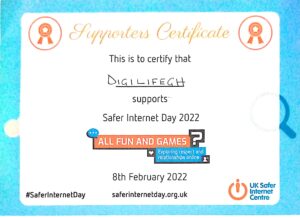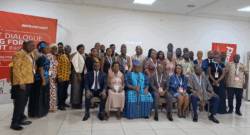- “…..when kids are online, they’re reading, thinking, analysing, criticizing and authenticating – composing their thoughts…………………”
We are called to greater responsibility in today’s digital age as parents and guardians. Our children are certainly online and exploring various websites and platforms. In so doing, they are being exposed to all sorts of content. As guardians, we know that the online environment is not completely safe, and so have the responsibility to ensure children’s safety while on there.
This year’s theme seeks to highlight the need for respect and relationships beyond the fun and games young ones enjoy most online. The chosen theme is ‘ALL FUN AND GAMES? Exploring respect and relationships online’
From the ISPs to our homes, schools, Internet cafes and ICT centres across the country, children are accessing the Internet; and as stakeholders, we cannot pretend not to have noticed this.

“All concerned stakeholders need to help bridge the existing gap between parents and children on one hand, and the teachers and students on the other. This should be done with a view to providing the much-needed avenue through which the activities of children and young people on the Internet can be monitored and controlled. Imperative to this is the need for parents and teachers to develop their IT skills.” …..African Children Cyber Safety Initiative http://www.itu.int/osg/csd/cybersecurity/gca/cop/policy.html
Since 2012 when the SMARTKLIQ / DIGILIFEGH’s GHANAIAN CHILD’s INTERNET SAFETY CAMPAIGN started, several interactions have been had with quite a number of students in some metropolises within the Greater Accra and Ashanti Regions.
It turned out that about 50% of the children in Upper primary have accessed the Internet and about 70% of those in JHS1 to JHS3 have accessed it – performing various activities which include chatting. About 50% of those in JHS have a Facebook profile.
Findings have shown that the Internet has a lot of benefits as far as our children’s development is concerned. The Internet has been said to help a child’s cognitive, social, emotional and even physical development.

You will all agree that our early stages as humans are characterised by finding and trying out things. The Ghanaian child in this era will seize every opportunity in wanting to be inquisitive about things happening around him/her. The technological tools, especially the Internet, make it easy for our younger generation to seek and find information that hitherto would have been inaccessible.
Go around the city and urban areas and see how children are making things happen on the Internet in ways parents can’t keep pace with – most especially in our part of the world, where the Internet is a no-go area for many parents.

Come to Tema and Ashaiman where I live: the Internet is a part of the children’s daily lives here. Quoting one anonymous writer: “When kids are online they’re reading, thinking, analysing, criticising and authenticating – composing their thoughts. Kids use computers for activities that go hand-in-hand with our understanding of what constitutes a traditional childhood. They use technology to play, learn, communicate and form relationships as children always have. Development is enhanced in an interactive world”.
Seeing all that is in stock online for our children, it would be unwise to keep them away from the Internet. A huge responsibility, therefore, lies on us stakeholders (parents, teachers, religious bodies, government agencies etc.) to ensure that our children are responsible when in the virtual world.
Reports have it that about over 2 million Ghanaians are online, and about half of this number is on Facebook alone. I don’t know about you, but for me, such statistics give me a lot to think about.










